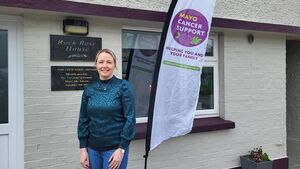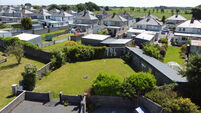A safe space in Mayo for people impacted by cancer

Orla Gillespie pictured outside Rock Rose House, Mayo Cancer Support's headquarters, in Castlebar.
Orla Gillespie (nee Hearns) took a leap of faith two years ago – a leap that has resulted in ensuring she is changing lives and supporting those who need it most every day.
Orla is an accomplished journalist, who spent time at the and the . After a distinguished 25 year career spent mainly with the , she decided that she wanted a new challenge. An opening at Mayo Cancer Support, based in Castlebar, as their Fundraising and Communications Officer became available at the same time and Orla made the change. She has since taken up the role of Manager of Mayo Cancer Support and you can tell from the minute I enter her office how much the work the charity does means to her on a personal and professional level.
Orla, thanks for chatting to me. Tell me a little about yourself.
I'm pretty much a native of Sligo. My family moved around a fair bit. I'm the youngest of three kids, so by the time I'd come along, we'd settled in Sligo. I was about six. I was mostly educated there, primary and secondary school. My parents are originally from Dublin. I have one older brother and older sister. After school, I went to college in what was UCG back in the day, now University of Galway, and I did an arts degree. After that I went on and did a Masters in English Literature and Publishing.
What line of work did you go into when you finished your Masters?
I was lucky. On the publishing side of things, I got experience through the Masters and when I graduated, I then started looking for a real job. I was working in the book retail industry at that stage, but I was very lucky. The , my local paper, took me on eventually, about a year after I'd graduated, as what they called a cub reporter back then. I didn't have the straight-out degree in journalism, so you learned on the job, and you certainly do learn on the job. When you make a mistake, you learn from that mistake, you don't make it again. That's how I landed in journalism and spent the next nearly 25 years as a journalist.
So you started your journalism career in the - where did that take you?
It didn't take me too far geographically, because I spent about two and a half years learning the ropes with the , and then an opening came up with the , and I was lucky enough to be offered that job after the interview. I moved over to Ballina in 2000. My husband is a Mayo man, so before too long, the roots were put down, and we stayed in Ballina, and I stayed with the right up until 2022.
What did you enjoy about working in journalism?
It might sound contrived, but it was lovely coming into a community like Ballina. I found it very welcoming, and I found the people great. There's such a strong community spirit there that I hadn't necessarily encountered before. If it doesn't sound too much to say, I genuinely found it a privilege to be responsible for writing stories about that area. You're in a very privileged position when you're interviewing people, and they're sharing their stories and their backgrounds with you, and no two days are the same.
I also enjoyed my time in the courts. I found the legal side of it interesting. I loved watching a good legal argument in the courts and even at one stage I thought, 'Maybe would I go back to college and do law?' But the kids came along, and it just didn't happen.
You decided you wanted a change Orla, what was the thought process behind that?
It's like any big decision, there's probably a number of factors. It's family life, it's career ambition, it's a number of things. But I suppose I was hungry for a new challenge and 20, 25 years - it's a long time doing the one job. Also, if I'm honest, I felt the job was changing a lot, especially with the advent of digital media and the internet. It was just always on. It was a number of elements coming together that made me just start looking casually, and that's what I was doing. I was just looking casually. I wasn't desperate to get out or anything, but this opportunity in Mayo Cancer Support in Fundraising and Communications came up in 2021 and I took up the role of manager since then, after Trisha Greavy left the position.
For people who don't know, what type of work does Mayo Cancer Support do?
We concern ourselves with providing emotional support to people impacted by cancer. That's not just the cancer patient, that's their family and friends as well. Our founding members, 25 years ago, when we were set up, would have been people with first-hand experience of cancer, a lot of them are cancer survivors themselves. They recognised, and we continue to recognise, that there was a niche there, particularly maybe when you'd come out from your treatment, and you'd recovered, often that's only when it hits you, just everything that you've been through, and I think a lot of people have that experience. When they're back into 'normal life' and everyone is saying, 'Isn't it great? You're back to normal'. But actually, a lot of the time that's when it can hit people what they've been through, and they can often have a little wobble at that stage, where they just need a little bit of extra support.
Outside of that, when you have your diagnosis or when you're going through your treatment, a lot of us can protect those around us, that's your knee-jerk reaction, 'I'm having a bad day, but I don't want you to worry' or 'I'm terrified here, but I don't want you to know that, and I don't want you to be terrified'. We protect everybody, and we internalise all that fear as well. Again, the founding members would have known about that and known that, wouldn't it be lovely to provide a safe haven where people can come? They can just let that out, and they can just express those feelings to people who have lived experience and professional experience of helping you through that and give you the skill sets to navigate your way through it.
Fundraising is tough - I know you have great supporters but it's an ongoing challenge.
We certainly have incredible loyalty from our clients but, unfortunately, the ask just keeps going bigger and bigger. People's lives are getting busier and busier, so it is a constant challenge. As the people who are asking and also delivering the service, it's a very fine line. We don't like to ask because it's a free service, and that's something that I'd really like to stress. We don't charge for anything that happens here, and so it seems a contradiction in terms, if people are leaving after the treatment, and you say, 'Oh, by the way, can you help us out? Can you fundraise?' We don't really ask too much. Obviously, the demands, the costs of running the service keep getting higher all the time. The funding streams, they're more competitively challenged all the time. There's more and more organisations looking for funds from the same pool of money, so it doesn't get any easier. But we are hugely grateful to the many loyal volunteers, people who've been with us since the start, and you can still pick up the phone and ask them, 'Could you help us out?' There are never any questions asked. It's breathtaking the kindness that is out there and the generosity.
What type of fundraising is happening at the moment?
One of the most immediate ones, which we always had a long-standing relationship with, is the Mayo.ie Western People West of Ireland Women's Mini Marathon. If I could definitely flag that one to anyone who's reading this piece and thinking about walking or running in that event on May 5th, if they would consider doing it for a charity, we're one of the listed charities there. If you're registering online you will see us, or if you don't want to register online, you can certainly contact us, and we'll help them out.
What keeps you driven Orla?
Every single member of staff here are amazing. I'm so honoured to work with them. I almost get emotional because I see what they do. I'm just here behind the desk doing the paperwork, by and large. Although we're a small team, we all help out. Our therapists and our volunteers are amazing. The magic that they create with people. Quite recently, I know there was somebody who rang us, and she was just in crisis. She'd had a diagnosis, she didn't know where to turn. There were family issues as well. She was literally having a full-on panic attack. We were able to get her in very quickly to see a counsellor. She sent me an email that weekend that I forwarded on to the counsellor - a couple of lines. It just said, 'I met your lovely counsellor, now I can breathe again.'
It's that gift of giving people that space, that time to just process everything. A little bit of a skillset, which we can do through the counselling and the other activities we do, is very much grounded in self-care and mindfulness and just the ability to try and stay in the present and deal with what you're going through one step at a time. I get messages like that on a regular basis, and it's just such a privilege.
As I said, it's not me, it's the people who actually work with the clients who come in the door and just help them in that way. It's a lovely phrase, 'holding space'. One of our counsellors just mentioned it to me the other day and I did a Facebook post about it myself. She was talking about how much she loved her work and that she sees what she does as this holding space for people. There was a beautiful definition of it when I looked it up, and it was just that, just literally giving them the space to come in and say whatever they need to say where they're not judged, and they don't have to worry about, how it impacts everybody. That's the power of what we do here.




